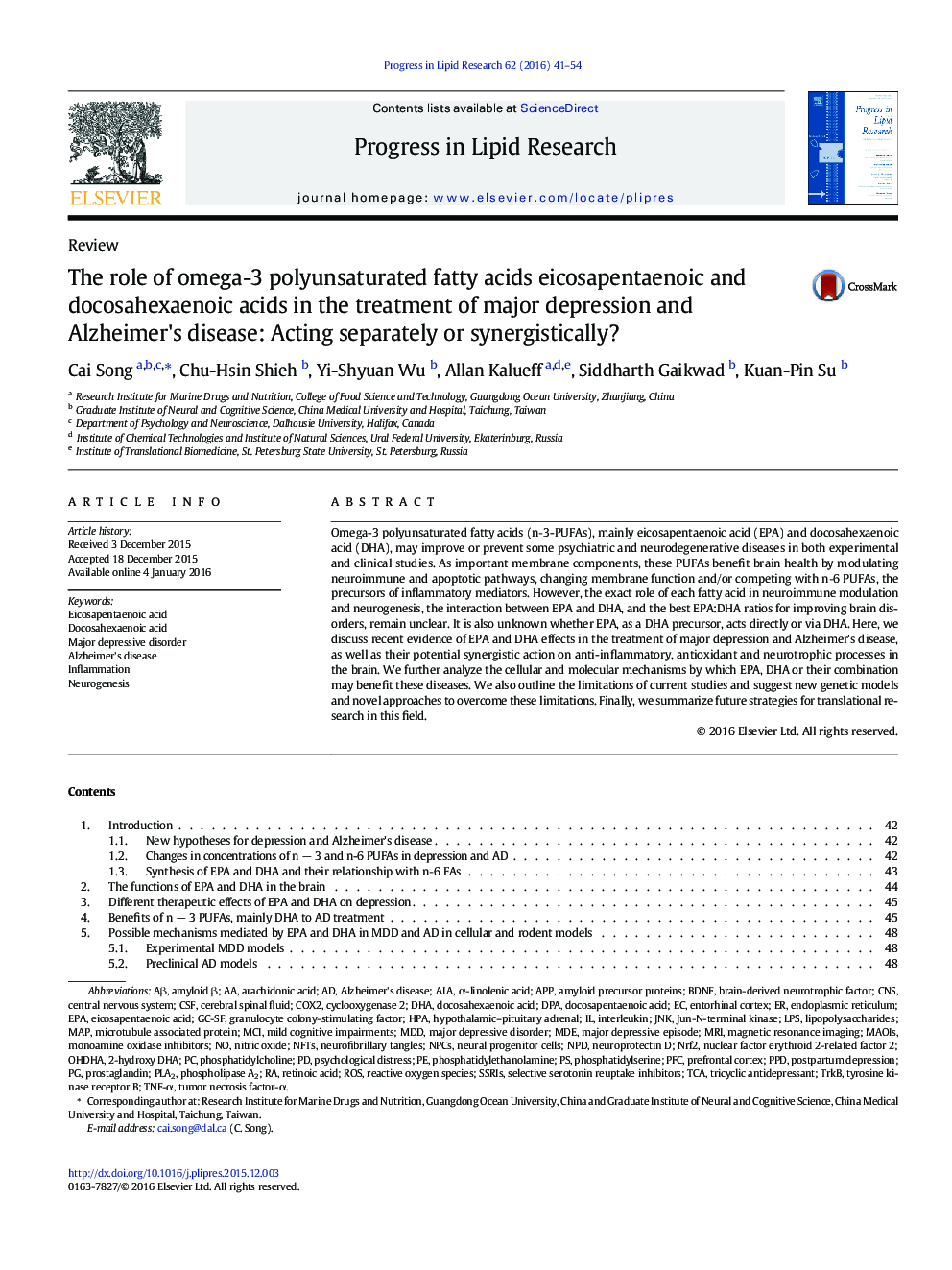| کد مقاله | کد نشریه | سال انتشار | مقاله انگلیسی | نسخه تمام متن |
|---|---|---|---|---|
| 2019089 | 1542168 | 2016 | 14 صفحه PDF | دانلود رایگان |
عنوان انگلیسی مقاله ISI
The role of omega-3 polyunsaturated fatty acids eicosapentaenoic and docosahexaenoic acids in the treatment of major depression and Alzheimer's disease: Acting separately or synergistically?
ترجمه فارسی عنوان
نقش اسیدهای چرب اشباع نشده اسیدهای چرب امگا -3 ایکوزاپنتانوئیک و اسید داکوزاگزنئوئیک در درمان افسردگی و بیماری آلزایمر: عمل به صورت جداگانه یا همزمان؟
دانلود مقاله + سفارش ترجمه
دانلود مقاله ISI انگلیسی
رایگان برای ایرانیان
کلمات کلیدی
Jun-N-terminal kinasecox2APPALAMDDNFTsAβNrf2MDEEPADPALPSJnkNPDBDNF - BDNF یا فاکتور نورونزایی مشتقشده از مغز MAOIs - MAOI هاNPCs - NPC هاamyloid β - آمیلوئید βMajor depressive disorder - اختلال افسردگی عمدهα-linolenic acid - اسید α-لینولنیکArachidonic acid - اسید آراشیدونیکEicosapentaenoic acid - اسید ایکوزاپنتانوئیکdocosapentaenoic acid - اسید داکوزاپنتانوئیکdocosahexaenoic acid - اسید داکوزاگزوائونیکMRI - امآرآی یا تصویرسازی تشدید مغناطیسیinterleukin - اینترلوکینAlzheimer's disease - بیماری آلزایمرMagnetic resonance imaging - تصویربرداری رزونانس مغناطیسیCNS - دستگاه عصبی مرکزیDHA - دوکوساهگزائنوئیک اسیدNeural progenitor cells - سلولهای پیش گیاه عصبیCerebral Spinal Fluid - سیالات مغزی نخاعیcentral nervous system - سیستم عصبی مرکزیcyclooxygenase 2 - سیکلوکوکسیژناز 2endoplasmic reticulum - شبکه آندوپلاسمی granulocyte colony-stimulating factor - فاکتور تحریک کننده کلنی گرانولوسیتBrain-derived neurotrophic factor - فاکتور نوروتروفی مشتق شده از مغزnuclear factor erythroid 2-related factor 2 - فاکتور هسته ای عامل erythroid 2 مرتبط 2Major depressive episode - قسمت عمده افسردگیEntorhinal cortex - قشر انتورینالLipopolysaccharides - لیپوپلی ساکارید هاCSF - مایع مغزی نخاعیMonoamine oxidase inhibitors - مهار کننده های مونوآمین اکسیدازneurofibrillary tangles - مگس های نوروفیبریلیالHPA - میلی بار یا هکتوپاسکالmap - نقشهNitric oxide - نیتریک اکسیدMCI - همراه اولmicrotubule associated protein - پروتئین مرتبط با میکروتوبول
موضوعات مرتبط
علوم زیستی و بیوفناوری
علوم کشاورزی و بیولوژیک
دانش تغذیه
چکیده انگلیسی
Omega-3 polyunsaturated fatty acids (nâ3-PUFAs), mainly eicosapentaenoic acid (EPA) and docosahexaenoic acid (DHA), may improve or prevent some psychiatric and neurodegenerative diseases in both experimental and clinical studies. As important membrane components, these PUFAs benefit brain health by modulating neuroimmune and apoptotic pathways, changing membrane function and/or competing with nâ6 PUFAs, the precursors of inflammatory mediators. However, the exact role of each fatty acid in neuroimmune modulation and neurogenesis, the interaction between EPA and DHA, and the best EPA:DHA ratios for improving brain disorders, remain unclear. It is also unknown whether EPA, as a DHA precursor, acts directly or via DHA. Here, we discuss recent evidence of EPA and DHA effects in the treatment of major depression and Alzheimer's disease, as well as their potential synergistic action on anti-inflammatory, antioxidant and neurotrophic processes in the brain. We further analyze the cellular and molecular mechanisms by which EPA, DHA or their combination may benefit these diseases. We also outline the limitations of current studies and suggest new genetic models and novel approaches to overcome these limitations. Finally, we summarize future strategies for translational research in this field.
ناشر
Database: Elsevier - ScienceDirect (ساینس دایرکت)
Journal: Progress in Lipid Research - Volume 62, April 2016, Pages 41-54
Journal: Progress in Lipid Research - Volume 62, April 2016, Pages 41-54
نویسندگان
Cai Song, Chu-Hsin Shieh, Yi-Shyuan Wu, Allan Kalueff, Siddharth Gaikwad, Kuan-Pin Su,
